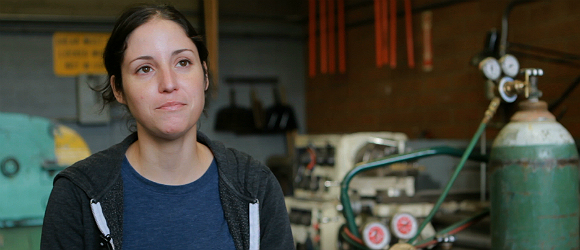
(Photo Credit: Angel Cardenas)
You’d think a former marine and single-mother student studying automotive technology would have her hands full. She does. Nevertheless, Rachel Mullen has volunteered to serve once again. This time, in her native state of California on a task force that’s engaged in what she calls “an exciting mission.” The goal: closing the massive skills gap in our workforce. The way Mullen sees it, “This is going to affect the future of the entire state and I plan on being here for a while.”
Of all the statistics bearing evidence of a workforce skills gap, consider the most sobering one: California’s skills gap is one of the widest in the country. Half a million middle-skill job openings in this state went unfilled last year in areas including manufacturing, IT and health care.
Now for the good news: Mullen, who once drove Humvees and state-of-the-art vehicles called “7 tons,” is helping steer the Task Force on Workforce, Job Creation and a Strong Economy. She’s been impressed since Day One. “I couldn’t believe I was in a room with so many incredibly intelligent people tossing ideas around, trying to solve this huge problem.”
The California Community Colleges Board of Governors commissioned the Task Force on Workforce, Job Creation and a Strong Economy to brainstorm and recommend ideas that would help the Colleges fill the skills gap in the state.
Mullen offers a unique perspective on the task force, and not just as a millennial student and parent. Being in the relatively small group of women seeking careers in the automotive industry will understandably get her noticed, but she’ll need the latest skills to make a lasting impression.
“One problem is that there are lots of auto-related studies that aren’t included in the curricula designed to help me earn a degree,” said Mullen. “The last thing I’ll want to do is go back to school to learn a specific skill I could’ve taken the first time around.”
Joining Mullen on the task force is Brian Burrell, the California Policy and Organizing Manager for Young Invincibles, a national non-profit advocacy group that focuses on empowering young America with increased job opportunities. Burrell has already helped organize focus groups with employers who are desperate for more skilled workers.
“This is a large, innovative state with new technologies that didn’t exist a year ago,” said Burrell. “Here in San Francisco, there are a lot of high-tech companies looking for computer literate workers and an increased demand for health care workers. There are jobs that aren’t being filled today.”
Case in point: The salary of the average Career Technical Education (CTE) graduate from the Community Colleges in five years is $66,000, according to data from the Colleges’ Salary Surfer. CTE jobs are a path out of poverty, but many students regard them as a road for the lesser. Mullen witnessed the illogical stigma first hand: “When I was coming out of high school, the whole technical jobs thing was seen as the lower rungs of the career ladder. I’m sure one of these days a CTE will be regarded as important as a science degree.”
With that level of confidence, it’s easy to imagine a Mission Accomplished sign in the task force’s future, especially when Mullen explains an observation she made during her four-year stint in the Marines.
“In the military, decisions made exclusively at the top were often flawed because there was no input from the bottom,” said Mullen. “We’re going to close the job skills gap with working, realistic solutions because they’ll come from a variety of people, not just a bunch of folks who haven’t been in school for a while.”
That kind of grassroots work aided the California Economic Summit, which came up with a list of seven priorities needed to boost our economic health and based on input from all regions of the state. Those priorities include improved housing, advancing manufacturing and a team focused on building up California’s workforce for the 21st century.

